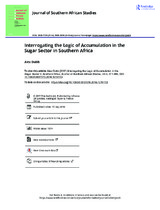| dc.description.abstract | The southern African sugar sector has attracted renewed attention from academics, policymakers, non-governmental organisations and the media, and is often portrayed in starkly
contrasting narratives of ‘boom or bust’,1
‘development’ or corporate corruption. In contemporary
scholarship on the agrarian political economy of Africa, sugar is often included as a key case
in contemporary debates on land (or water) ‘grabbing’, ‘socially inclusive’ business models,
contract farming, biofuel production, as well as in long-running debates on the politics of land reform, rural accumulation and national development.2
Sugar’s place in these debates has some
distinctive features. Whereas other land-based and agro-industrial development schemes have
tended to stall, expansion of large South African sugar companies into the wider region has
witnessed substantial productive investments and boasted improved levels of employment in
several countries, as well as opened opportunities for production by thousands of small-scale
farmers. Key questions that arise include: what has driven this expansion, what have been its
effects to date, and what is its wider significance for debates on the potential of large-scale
agricultural investments to reduce rural poverty?
This article seeks to assess the dynamics of the southern African sugar sector by examining
the ‘logic’ of capital accumulation. It does so through analysis of value relations, as understood
in Marxist political economy, an approach rooted in the changing productivity of labour and
its effects on profitability, and influenced by mercantile (trade) relations and their politics.
However, there are a number of product-specific reasons for the drive to achieve economies of
scale and increased levels of agro-industrial integration in sugar, strongly influenced by sugar
cane’s perishability and the need to locate cultivation in close proximity to processing plants. | en_US |

